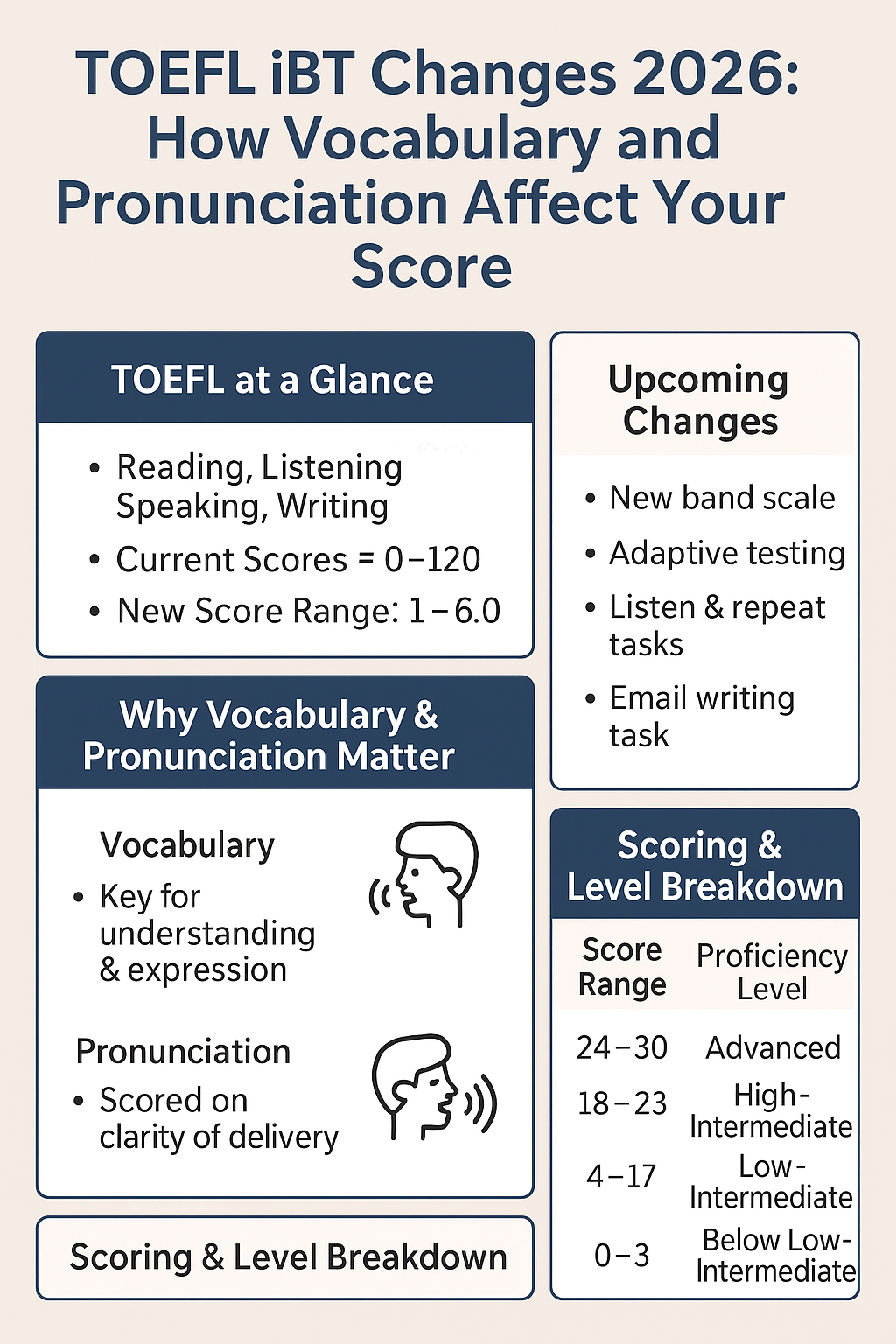Introduction
If you’re preparing for the TOEFL iBT, 2026 brings significant changes that will affect how your English skills are evaluated. Whether you’re taking the test for academic, professional, or immigration purposes, mastering vocabulary and pronunciation remains critical—especially with a new scoring format on the horizon.
In this blog, we’ll explore how these skills directly impact your score and what you need to know to prepare effectively for the evolving TOEFL landscape.
What Is the TOEFL iBT and Why It Matters
The TOEFL iBT (Internet-Based Test) is the most recognized English language proficiency exam, widely accepted by universities, governments, and employers worldwide. It evaluates your ability to use and understand English in an academic setting through four sections:
- Reading
- Listening
- Speaking
- Writing
The test is entirely computer-based, lasts just under two hours, and allows note-taking throughout. TOEFL scores remain valid for two years and do not follow a universal pass/fail format—each institution sets its own minimum score requirements.
TOEFL iBT Scoring System: 2025 vs. 2026
Current TOEFL Scoring (Valid Until Jan 20, 2026)
- Total Score: 0 to 120
- Sectional Scores: Each section is scored from 0 to 30
- Grading: A mix of human raters and AI tools like SpeechRater® (Speaking) and e-rater® (Writing)
New TOEFL Scoring (Begins Jan 21, 2026)
- New Band Scale: 1.0 to 6.0 in 0.5 increments
- CEFR Aligned: Matches global language proficiency standards
- Dual Reporting: For two years, both old and new scores will appear on reports
This scoring update ensures clearer score interpretation across global institutions and simplifies the admissions process.
Why Vocabulary and Pronunciation Are More Important Than Ever
Vocabulary
Strong vocabulary enhances performance in all four sections:
- Reading: Understand complex academic texts
- Listening: Comprehend lectures and conversations across accents
- Writing: Use varied, precise words to express ideas clearly
- Speaking: Increase fluency and natural expression
Examiners focus on clarity and variety—not complexity. Overusing rare or difficult words that don’t fit context can hurt more than help.
Pronunciation
In the Speaking section, pronunciation is key to your delivery score:
- Clarity: Your speech must be easy to understand
- Flow: Smooth, well-paced delivery is essential
- Intonation: Natural rhythm and tone improve listener comprehension
- Accent: Not penalized unless it affects understanding
High-scoring responses are clear, fluid, and expressive—even if there are minor lapses.
New Speaking & Writing Tasks in 2026 TOEFL
Starting in 2026, new tasks in the Speaking and Writing sections will place a greater emphasis on spontaneous language use and real-world communication:
New Speaking Tasks:
- Listen & Repeat: Repeat short spoken phrases
- Virtual Interview: Respond to workplace-style questions
New Writing Tasks:
- E-mail Response: Write clear, structured replies to prompts
These changes require not just knowledge, but also quick thinking and confident expression—skills directly enhanced by vocabulary mastery and pronunciation practice.
Strategies to Boost Your Vocabulary
- Use Academic Word Lists (AWL)
Focus on words commonly used in academic English - Group by Topic
Learn vocabulary in thematic clusters: education, environment, technology, etc. - Use It or Lose It
Apply new words in writing and speaking exercises - Flashcards & Spaced Repetition Tools
Use apps like Anki or Quizlet to retain and recall words efficiently
How to Improve Your Pronunciation for TOEFL
- Record Yourself Speaking
Listen for clarity, pace, and intonation - Shadow Native Speakers
Imitate audio recordings word-for-word with matched rhythm and tone - Use Feedback Tools
Platforms like My Speaking Score and TOEFL TestReady give instant AI feedback on pronunciation - Practice Varied Accents
TOEFL Listening and Speaking sections include American, British, Australian, and other English accents
TOEFL Test-Taking Tips for the New Format
- Adapt to Adaptive Sections:
Reading and Listening are now adaptive, so performance in early questions affects difficulty later. - Time Management:
Use the streamlined interface and preview prompts to pace yourself. - Familiarize with New Tasks:
Practice Listen & Repeat and email writing ahead of time using mock test tools. - Check Out Updated Tech:
Expect noise-cancelling headphones, real-time scoring previews, and improved accessibility.
Conclusion
With the TOEFL iBT evolving in 2026, understanding how vocabulary and pronunciation affect your score has never been more critical. From new Speaking and Writing tasks to a completely revamped scoring scale, now is the perfect time to adapt your preparation strategy.
Prioritize clarity, fluency, and real-world communication—and you’ll be ready to tackle the next generation of the TOEFL with confidence.
FAQs
Q: Will my accent affect my TOEFL Speaking score?
A: No. Your accent is not penalized unless it affects clarity or intelligibility.
Q: How long are TOEFL scores valid?
A: TOEFL iBT scores are valid for two years from the test date.
Q: What are MyBest® Scores?
A: ETS combines your highest section scores from different test dates (within 2 years) to create an optimized total score.
Q: What does the new 1–6 scoring scale mean?
A: It aligns TOEFL scores with CEFR levels, making interpretation easier for international institutions.

